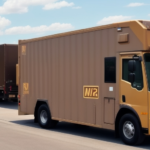Introduction to UPS Shipping Costs
Understanding UPS shipping costs is essential for businesses and individuals looking to optimize their shipping strategies and manage expenses effectively. UPS is a leading global logistics company, and its pricing structure can be complex due to various factors. This article delves into the key elements that influence UPS shipping costs, offers strategies to reduce expenses, and provides insights into managing your shipping needs efficiently.
Factors Influencing UPS Shipping Rates
Package Weight and Dimensions
The weight and dimensions of a package are primary determinants of UPS shipping costs. UPS utilizes a dimensional weight pricing model, which considers the size of the package relative to its actual weight. The dimensional weight is calculated by multiplying the package's length, width, and height in inches and dividing by a factor of 139 for domestic shipments or 166 for international ones. This means that larger, lighter packages may incur higher fees compared to smaller, heavier ones.
Distance and Delivery Speed
The distance between the origin and destination and the desired delivery speed significantly impact shipping costs. Longer distances and expedited shipping options, such as Next Day Air or 2nd Day Air, typically result in higher charges. Conversely, ground shipping is generally more cost-effective for longer distances but takes more time to deliver.
Type of Shipment and Item
The nature of the items being shipped also affects costs. Fragile or hazardous materials may require special packaging or handling, leading to additional fees. Moreover, higher-value items might necessitate insurance, which UPS offers at an extra cost to protect against loss or damage.
Seasonal Variations
Shipping costs can fluctuate based on seasonal demand. During peak periods, such as the holiday season, UPS may implement surcharges to manage the increased volume of shipments. Planning shipments in advance can help avoid these additional fees and ensure timely delivery.
How to Calculate UPS Shipping Costs
Using the UPS Online Calculator
UPS provides an online shipping calculator that allows users to estimate shipping costs accurately. By entering the origin and destination zip codes, package weight and dimensions, shipping speed, and desired service level, users can obtain a detailed cost estimate. This tool is invaluable for budgeting and comparing different shipping options.
Understanding Dimensional Weight
As mentioned earlier, UPS's dimensional weight pricing can affect shipping costs. Accurately measuring your package and understanding how dimensional weight is calculated can help you optimize package size and reduce costs. [Learn more about Dimensional Weight](https://www.ups.com/us/en/services/shipping.page).
Negotiating Discounts for High Volume Shippers
Businesses that ship large volumes regularly may qualify for discounted rates. Engaging with a UPS representative to discuss shipping needs and volumes can lead to customized rate agreements, resulting in significant savings. According to UPS, high-volume shippers can benefit from tailored pricing models that align with their specific requirements.
UPS Shipping Options Compared
Ground vs. Air Shipping
UPS offers a variety of shipping options tailored to different needs. Ground shipping is the most economical choice, ideal for non-urgent deliveries. In contrast, air shipping options like Next Day Air and 2nd Day Air provide expedited delivery but come at a higher cost. Choosing the right shipping method depends on your urgency and budget constraints.
International Shipping Services
For global shipments, UPS provides several international shipping options, including Worldwide Express and Worldwide Saver. These services vary in delivery speed and cost, allowing businesses to choose based on their international shipping needs. Understanding customs regulations and potential import/export tariffs is crucial for minimizing delays and additional costs. [UPS International Shipping](https://www.ups.com/us/en/services/international.page)
Strategies to Save on UPS Shipping
Optimizing Package Dimensions
Reducing the size of your packages can significantly lower shipping costs, especially when dimensional weight is a factor. Use appropriately sized packaging and avoid excessive padding to keep dimensions minimal without compromising the safety of the contents.
Using UPS Packaging Supplies
UPS offers a range of free packaging materials, including boxes, envelopes, and labels. Utilizing these supplies can reduce your packaging expenses and ensure compatibility with UPS handling requirements. Using non-UPS branded packaging may result in additional fees or delays.
Comparing with Other Shipping Carriers
While UPS is a reliable carrier, it's beneficial to compare rates and services with other shipping providers like FedEx, DHL, and USPS. Each carrier has its strengths and may offer more competitive rates for specific shipping needs. Tools like shipping rate comparison platforms can assist in making informed decisions.
Understanding and Managing UPS Accessorial Fees
Common Accessorial Charges
Accessorial fees are additional charges for services beyond standard pickup and delivery. Common fees include residential delivery, delivery area surcharges, and fees for oversized or hazardous packages. Being aware of these potential costs can help you budget more accurately.
Minimizing Additional Fees
To avoid unexpected accessorial fees, ensure that packages meet UPS's size and weight requirements. Properly labeling shipments and providing accurate information can also prevent unnecessary charges. Additionally, opting for standard delivery options when possible can reduce the likelihood of incurring extra fees.
Tracking Shipments and Managing Shipping Costs
UPS Tracking Tools
UPS offers robust tracking tools that allow users to monitor the status of their shipments in real-time. Features like UPS My Choice provide detailed tracking information and delivery notifications, helping businesses manage their logistics more effectively.
Setting Up Alerts and Notifications
Setting up alerts for your shipments can keep you informed about delivery statuses, delays, or issues. Receiving notifications via email or text ensures that you can respond promptly to any changes or problems, maintaining smooth shipping operations.
Conclusion
Managing UPS shipping costs requires a comprehensive understanding of the various factors that influence pricing. By optimizing package dimensions, selecting the appropriate shipping options, leveraging UPS's online tools, and negotiating discounts for high-volume shipments, businesses and individuals can significantly reduce their shipping expenses. Staying informed about accessorial fees and utilizing tracking tools further enhances the ability to manage and control shipping costs effectively. As the logistics landscape evolves, continuous evaluation and adaptation of shipping strategies will ensure ongoing cost efficiency and operational success.






















